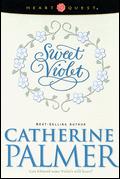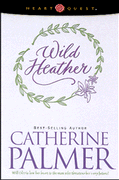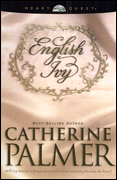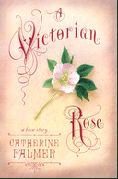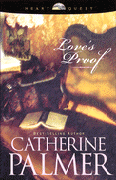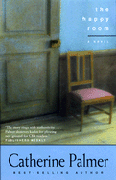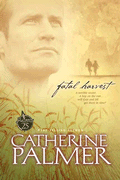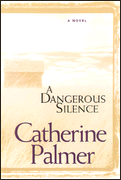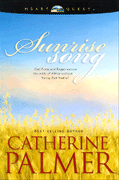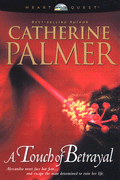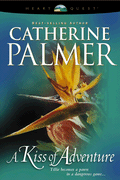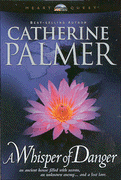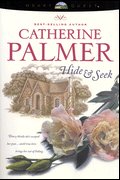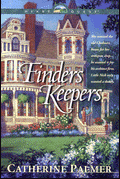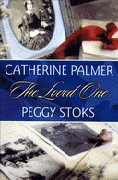
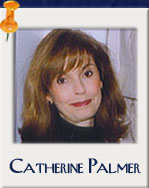
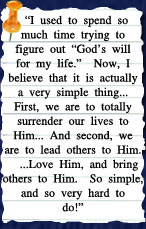
|
Focus on Fiction is pleased to feature Catherine Palmer Catherine is an award-winning, well-loved author known for stories filled with compelling characters and strong messages of faith. Her many books include The Happy Room, A Town Called Hope series, Treasures of the Heart series, the Finders Keepers series, and the English Ivy series. She is a graduate of Southwest Baptist University and holds a master’s degree in English from Baylor University. Catherine makes her home in Missouri with her husband, Tim, and sons Geoffrey and Andrei.
|
|
Focus: Catherine, we’re honored to have you with us! Your writing career began a number of years ago, in a way that’s been described as, “So dramatic and sudden it was almost like a fairy tale”. Can you tell us more about this fairy tale beginning? Catherine Palmer: Thank you for inviting me to join you! My writing career got off to an unusual start. Not long after finishing graduate school with a master’s degree in English literature from Baylor University, I wrote a long medieval saga about a woman’s life in England. I tried to sell the book and failed, so I put it away. One day, my mother-in-law phoned to tell me a romance convention was coming to Albuquerque (not too far from us) and there was a contest in conjunction with the conference. She suggested I send in “that medieval thing you wrote.” I protested, saying my book wasn’t a romance or anything of the sort! She prevailed (as mothers-in-law often do), and I’m so grateful. I had to send only one chapter to the contest, so I added what I thought was a good romance hero. To my shock, I won Best Historical Romance Novel and Best of Show with my medieval “romance novel.” New York agents and editors came up to me asking to see all my romance novels. It was truly a fairy tale evening, and I was even wearing borrowed clothes! I raced home and began praying – along with my husband – about the possibility of writing secular romance fiction. After much soul-searching, I felt this was the direction God wanted me to take, even though it meant entering a very different world from the safe Christian bubble in which I had been brought up as the daughter of missionaries. I signed with an agent, and one year later, I sold my first romance novel. Focus: Your writing journey began as a fairy tale, but it got tougher as the years went on. What challenges did you face while writing for the secular market? Catherine Palmer: Although I kept my characters to a strict moral standard (no premarital sex), I did not feel that I was able to fully express what I believe about relationships. I am convinced that a truly successful marriage must be founded on Jesus Christ. My own 27-year marriage bears witness to this truth. Sadly, I learned that the editors of my secular fiction were too uncomfortable with this message to permit it in my books. In fact, they edited out almost every reference to prayer and God. I was distressed by this, but at the same time, I knew I was doing God’s will. Several things kept me going. One was that despite all the editing my books endured, somehow the message got through! I received many letters asking if I was a Christian. Readers sensed a difference in my writing and my characters. Also, while writing in the secular market, I had the blessing of meeting other devoted Christian women who were writing secular romances. Once I made the move to a Christian publisher, I contacted many of them, and they joined me. During those hard years, I knew I was to be a light shining in the darkness – no matter how small. Probably the hardest thing about writing in the secular market was the judgment I endured from well-meaning Christians. Most of those who criticized me so harshly had never read one of my books. They saw the covers (over which I had no control) and made their opinion known to me in very painful ways. I can say now that this helped me to become less judgmental myself. Christ put Himself in questionable places and chose “the least of these” as His brothers. I have learned that I am willing to do whatever it takes to follow Him, even if it doesn’t sit well with those who would judge me. Focus: You made the switch to Christian fiction in the early ‘90’s. What was the first story you wrote for the Christian market? Catherine Palmer: My first book for the Christian market was titled The Treasure of Timbuktu, published by Tyndale House Publishers. Later, this book and the second (The Treasure of Zanzibar) were repackaged to fit the new “HeartQuest” line of Christian romance novels which I had helped to found at Tyndale. They received new covers and new titles. Now these first two are called A Kiss of Adventure and A Whisper of Danger. They are joined by A Touch of Betrayal (which won the Christy Award in 2001) and Sunrise Song. Focus: Since that time, you’ve written how many books, thirty-five? Forty? Catherine Palmer: My thirty-ninth book, Sweet Violet from Tyndale House, has just arrived in bookstores, and my fortieth book will release in May from Steeple Hill. My first 14 books were written for the secular market and are out of print. The rest have all been with either Tyndale House or Steeple Hill. Focus: Among this amazing collection of books are prairie love stories, international tales of adventure, Victorian romances, contemporary suspense…the list goes on. Of these, which is your favorite genre? How about favorite setting? Or is it too difficult to choose?:) Catherine Palmer: I actually think most of my books fall into one genre – romance. While some of them have a strong suspense theme or an unusual setting, they’re still about male/female relationships. Really, only one full-length book would fall fully into the “mainstream” genre, and that is The Happy Room. Of all the settings in my romance novels, I’m most in love with Africa. That’s where I grew up, and my heart will always belong to Kenya. But I have become enchanted with the British Regency, which is the time period in which Jane Austen wrote Pride And Prejudice, Emma, Sense And Sensibility, and her other wonderful fiction. The Regency is the setting of my books in the little Yorkshire town of Otley, English Ivy, Wild Heather, Sweet Violet, and A Victorian Rose. I love this period so much that I’m starting a new series for Tyndale set during the Regency. It will begin releasing in early 2006 with Affectionate Adversary. Focus: With a writing repertoire as vast as yours, you must have a diverse reading appetite as well. Could you tell us about a few books you’ve enjoyed this year? Catherine Palmer: I’m embarrassed to admit that I can’t read fiction while I’m writing! I have found that the other author’s “voice” somehow begins to creep into my own. Suddenly I start sounding like someone else in my writing, and it’s a disaster! When I take my summer break, I usually devour as many books as I can. Lately, I’ve read books by Fannie Flagg. I also have loved the No. 1 Ladies’ Detective Agency series by Alexander McCall Smith. But most of the time, I’m reading non-fiction research material, like Jane Austen biographies or travel guides of India. Focus: Sweet Violet, your newest release, is certainly on the list of books we’ve enjoyed in 2005. What a startling, absorbing, delightful tale! Can you give us a quick synopsis of the story, and tell us which character you most identify with in the book? Catherine Palmer: I’m glad you enjoyed it! In Sweet Violet, we meet a headstrong young Englishwoman who was brought up by a Hindu nursemaid in Calcutta, India. Her English widower father has had little to do with Violet until the day he announces he intends to send her to England to marry a business associate. Violet Rosse immediately runs away from home into the Indian jungle. Desperate to find Violet, her father enlists the help of a young missionary. Edmund Sherbourne (of the Sherbournes of Thorne Lodge in Yorkshire) feels he has utterly failed in his mission of spreading the Gospel – until Malcolm Rosse offers him a permit to preach and a building to use as a church in Calcutta in exchange for finding Violet. The meeting of Violet and Edmund is a clash of culture and religious belief. The story evolves into a “Pygmalion” theme as Edmund tries to teach Violet how to be a proper English lady, while she teaches him the true meaning of surrender and love. I identify with Violet very strongly. In fact, she may be the single character I relate to the most in all my books. I don’t share her religious beliefs but, like Violet, I was deeply loved and influenced by the African “ayah” who raised me. I know exactly how it feels to be sent away from the country you love to a place that is supposed to be “home” but feels utterly foreign. I understand how it is to be unable to fit in, to look like an American but feel like someone else, to be so bewildered that you have no idea who you really are. Though I’ve lived in the United States many years now, my heart will always be African. Focus: One of the most wonderful things about your stories is their international flavor. In Sweet Violet, Wild Heather, and English Ivy, readers are transported to England and India. In your Treasures series—Sunrise Song, Whisper of Danger, Kiss of Adventure, and Touch of Betrayal—as well as your hard cover release, The Happy Room, we are whisked away to the exotic continent of Africa. What kind of feedback have you received from readers about the foreign settings in your books? Catherine Palmer: It’s funny, because people often don’t realize I’ve actually lived in those countries or have spent a lot of time there. So, I get many letters saying things like, “Your books make me feel like I’m inside a National Geographic special! How do you write that way?” I take that as a great compliment, and I’m so grateful to God for giving me such varied experiences with so many different types of people in so many unusual settings. People really enjoy being transported far from daily life with all its frustrations, and I’m happy my books can be their ticket to a place of rest as well as spiritual refreshment. Focus: Another fascinating thing about many of your books is the scientific element you’ve included. Some people think Christians check their brains at the doors of their churches. But what about you? Do you think science and Christ contradict each other? Or is it possible to believe in both? Catherine Palmer: That’s a great question. I have wondered why I write so much about science when I was not very good at it in school. In fact, my only college science class was “Beekeeping!” But I am incredibly fascinated by this world and how it works. Not only do I not see any contradiction between science and Christ, but I am convinced that Christ is the Creator of all natural laws and everything in this physical world. God keeps putting scientists in my path, and they tell me such amazing things that I can’t help but come up with plots for books. An atheist physicist told me about the box of documents containing Sir Isaac Newton’s attempts to mathematically prove the existence of God – which became the basis for Love’s Proof. A professor of sociology told me about the three food companies that control the world’s food supply – which became the basis for Fatal Harvest. And an anthropologist/archaeologist told me about viruses that can remain viable in skeletal material – which became the basis for A Dangerous Silence. I met the two professors at different times on an airport shuttle bus. And (I shamefacedly confess) I eavesdropped on the archaeologist in a restaurant, and later asked her about her work with skeletons. God keeps putting these scientists right in front of me – or at a nearby dining table! Maybe He knows I don’t understand science very well, so I can make it easier for readers to comprehend as I finally figure it out for myself. As for Christians checking their brains at the doors of churches – that makes me smile! We are challenged at every turn by life, and church is where we go for restoration and instruction, as well as praise and worship. Some of the most intelligent people I’ve ever met are Christians. An obedient Christian is always seeking to grow in Christ. That takes study, questioning, investigation, and deep thought. You certainly can’t leave your brain behind if you’re going to do all that. Focus: Besides science and faith, there are many other life changing messages in your stories, such as mercy, forgiveness, and reconciliation. What do you feel is the greatest message with which God has entrusted you, and why have you chosen fiction as the medium for that message? Catherine Palmer: Wow, that’s a big question. I love writing fiction, because readers get to actually “wear” the skin of the characters who are learning the important messages God has given me to tell. By stepping into a character – as we do when we read fiction – we actually go through the events of the book almost as if they are happening to us. In a much more active way than with non-fiction, we can experience real changes in our own lives! Probably the greatest message God has given me regards His will for Christians. I used to spend so much time trying to figure out “God’s will for my life.” Now, I believe that it is actually a very simple thing – and it’s the same for every Believer. God’s will for us is two-fold. First, we are to totally surrender our lives to Him. We do this by reading Scripture, attending church, worshiping Him, and doing everything possible to grow closer to Him and love Him more each day. And second, we are to lead others to Him. That means ministry, missions, getting out there with the message every day, all the time. So what is God’s will for me? Love Him, and bring others to Him. So simple, and so very hard to do! Focus: You’ve had a powerful impact on readers, not just through your writing, but also through your work as the consulting editor for Tyndale’s HeartQuest line. Can you tell us a little about your relationship with HeartQuest authors Lori Copeland and Peggy Stoks, and explain how your work with Tyndale was a catalyst for their switch to Christian fiction? Catherine Palmer: God has blessed me so much through my association with Tyndale House. Not long after I signed my first contract with them, I was having dinner with several of the executives. Ron Beers asked me to discuss my experiences in the secular market. As I was talking, I suddenly had a sort of vision, and I asked, “Why doesn’t Tyndale have a line of romance novels?” The men seemed a bit dumbfounded by this, and they wondered how a romance novel could be Christian. I said, “Romance novels are about a man and a woman meeting and overcoming the obstacles toward building a marriage to last a lifetime. What could be more Christian than that?” At that moment, Ron Beers and Ken Petersen captured the vision along with me. We began to work very hard to establish a line of affordable, high-quality romance novels. Several editors caught the fire, too, and Becky Nesbitt became the senior editor of the line. Anne Goldsmith, Kathy Olson, and several others joined in with great enthusiasm. Because I had met so many Christian authors while writing secular romances, I quickly began to make calls. Within a short time, we had Lori Copeland, Peggy Stoks, Ginny Aiken, and others writing for us. It was a glorious experience, and I consulted the HeartQuest team for several years until the editors felt they had it up and running successfully. I praise the Lord for giving me that vision so long ago, and I’m grateful for Ron, Ken, Becky, Anne, Kathy and everyone who has made HeartQuest such a success. Focus: Besides encouraging other writers, and working over the years with the HeartQuest line, you’ve kept very busy with new stories. You mentioned earlier that you’ve got another book releasing this year. Would you mind giving us a sneak peek into Love’s Haven? Catherine Palmer: Love’s Haven tells the story of a young widow who blames her husband’s best friend for not preventing him from falling to his death while the two were rock climbing. Nearly ready to deliver her first child, Mara Rosemond is shocked to find Brock Barnett at her apartment. The cocky bachelor realizes Mara is on the brink of losing everything – her home, her truck, and her husband’s archaeological company. In an effort to assuage his feelings of guilt, the wealthy Brock offers to marry Mara and give her child a home, a name, and a fortune in inheritance. Though she despises the man, Mara dreads bringing up her baby in the same kind of rootless poverty in which she was raised. This marriage of convenience seems doomed from the start, but God has a way of healing and restoring even the most brokenhearted. Focus: Writing so many books has got to be a solitary adventure at times. How can your readers and fans can be an encouragement to you? Catherine Palmer: Oh, what a wonderful thought! I would love for my readers to pray for me as I write. I know of one woman who keeps me on her prayer list, and I am very grateful. Many times, I feel attacked by the Enemy as I try to write. I need a buffer of prayer support around me, and I would be so thankful for readers who would lift me up to the Father. Focus: Is there anything else you would like your readers to know? Catherine Palmer: Yes. My husband recently came up with a novel way for us to support America's armed forces in this time of war. Tim and I personally bought 5,000 copies of The Loved One, a book I co-authored with Peggy Stoks, and as a ministry to those in the armed services, we are offering a free copy of the book to every military family that requests one. The Loved One is the story of a mother whose high-achieving, college-bound son shocks her with the announcement that God is calling him to enlist in the Army. The mother’s hobby is genealogy, and she discovers that their family has a military heritage dating back to the Revolutionary War. The story alternates between historical accounts of family members’ service to their country and the ongoing conflict between mother and son over his determination to serve. Sometimes you have to be willing to sacrifice the thing or the person you love the most, because the end result is worth it -- just as God sacrificed His only Son for us. That is the message of The Loved One, and it’s my prayer that the book will offer peace and comfort to those whose loved ones are serving. All the information about how to request copies can be found on my website: http://www.catherinepalmer.com/from_catherine/ I will autograph each copy, and inscribe the book to an individual if the name is provided. Tim and I see this as a way to support our troops in Iraq and around the world. I hope many armed services personnel will make the book a Mother’s Day gift. Please pray that God will use our efforts to reach those who need the message of this book most of all!
|











© Focus on Fiction, 2003-2005 All Rights Reserved. Site maintained by PulsePoint Design. Direct questions or comments here
| Home | Upcoming Author Interviews | Past Author Interviews | Christian Fiction Reviews | About Us | | FAQ’s | Contact Us | Links |

